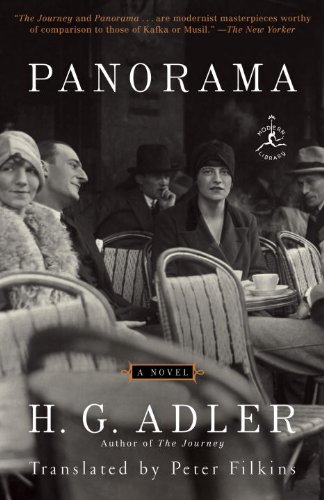Panorama
Originally published in German in 1968, and now finally (and finely) translated into English, Panorama is Prague author H. G. Adler’s stunning “novel saturated with autobiography” of growing up a Bohemian Jew at the close of the Great War through the end of World War II. In the first of ten segments, young protagonist Josef Kramer goes to the panorama with his grandmother. There, in a darkened room the viewers sit close to a backlit box, eyes tight to the viewing holes; scenes of history both ancient and modern pass by, beautiful to see but impossible to grasp.
This attempt to describe the world going by is the structure of the following segments: we see Josef at various intervals, from an awkward birthday party to boarding school to the Langenstein work camp (standing in for Adler’s experiences in Theresienstadt and Auschwitz), to a life, and decisions, briefly glimpsed after his release. Each segment, rather than being a chapter, is more like a scene from a short story, with few connections between each of Josef’s experiences. The characters, settings, activities, and politics change, becoming progressively darker as the book proceeds; Josef is the one constant, reporting and thinking about, not engaging in, the action. Only at the very end of the book do we begin to get a deeper sense of Josef, as he finally begins to open up. What is clear throughout is the pain of the familiar and the loved being wrenched away—a country (Bohemia and Czechoslovakia), a family, a society, an entire way of life.
Adler’s stream-of-consciousness style is adeptly translated by Peter Filkins, and the reader is easily swept into the flow of Josef’s thoughts. Panorama is no Joycean maelstrom of words and not-words, but instead a beautiful, accessible, story of a young man’s life.










